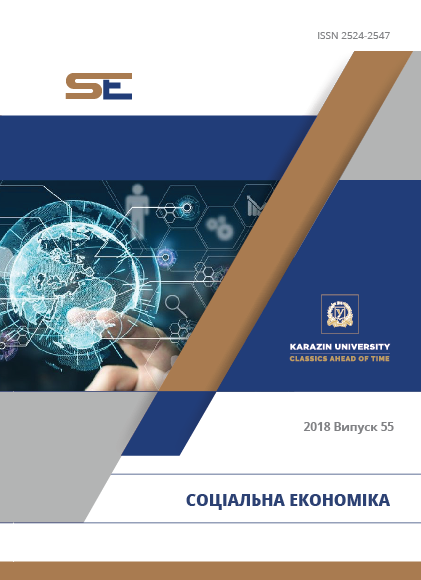Multidimensional Poverty as a Global Problem of Modern Socio-economic Development
Abstract
The article proves that poverty in today’s conditions is not only a difficult, but still not overcome, satellite of economic development, but also a phenomenon that is becoming more diverse. Poverty reduction is one of the necessary conditions for the transition to sustainable development and the improvement of the quality of life.
A conclusion is made that poverty is a multidimensional category, for measuring which requires an integrated approach, assessing poverty from different points of view. Based on the analysis of modern conceptual approaches to the assessment of well-being, a system of various aspects of poverty is proposed, which includes not only insufficient income or consumption, but also poor health, nutrition and education, lack of social connections, insecurity and helplessness. The economic, social, demographic, educational, qualification, institutional, regional-geographical causes of poverty are systematized.
The specificity of gender inequality is considered, and the influence of gender inequality on the socio-economic and demographic development of society is confirmed. New aspects of poverty are considered: gender, age, children.
А «poverty trap» is studied as an economic phenomenon, which becomes significant and relevant due to its social acuity and possible negative and, under certain conditions, uncontrollable consequences. The sources of «poverty trap» formation, its stages and possible ways of overcoming «poverty trap» with the help of effective institutes and civil society are considered.
The division of poverty into an economic and social one is considered, and their interdependence is proved.
The specifics of inclusive and extractive institutes are analyzed and it is proved that the model of development with domination of inclusive institutions is an effective method of struggle against poverty. Proposals for reducing the rates of falling of living standards through the improvement of institutional mechanisms have been developed.
The problem of poverty in Ukraine is investigated and it is proved that in our country it has catastrophic scales and consequences. A number of changes in the economic, political, social and cultural spheres are proposed to reduce the level of poverty in Ukraine.
Downloads
References
World Bank. (2015). World Development Report. [online] Available at: http://documents.worldbank.org/curated/en/645741468339541646/pdf/928630WDR0978100Box385358B00PUBLIC0.pdf [Accessed 17.05. 2018].
Rumyantseva, E. Е. (2015). Strategy of Overcoming Poverty: monograph [“Strategiya preodoleniya bednosti”]. Moscow: Direct Media.
Banerjee, V. and Duflo, E. (2018). Poor Economy. How to free the world from poverty. [“Ekonomika bidnosti. Yak zvilnyty svit vid zlydniv”]. Kyiv: Nash format.
Zadorozhna, S. M. (2016). Institutional mechanisms for combating poverty in Ukraine [“Instytutsiini mekhanizmy podolannia bidnosti v Ukraini”], Publichne administruvannia: naukovi doslidzhennia ta rozvytok, 2(2), pp. 37–55.
Babak, I. M. (2013). Poverty as a criterion for evaluation [“Bidnist yak kryterii otsiniuvannia”]. Sotsialni tekhnolohii: aktualni problemy teorii ta praktyky, 57, pp. 41–48.
Tyutyunnikova, S. V. (2001). Poverty as a socio-economic phenomenon: content, forms, strategies of overcoming in the modern world [“Bednost kak sotsialno-ekonomicheskiy fenomen: soderzhanie, formyi, strategi preodoleniya v sovremennom mire”]. Sotsialnaya ekonomika, 3-4, pp. 88–102.
Zakon Ukrainy ‘‘Pro derzhavni standarty ta derzhavni sotsialni harantii’’ (05.12.2000). Vidomosti Verkhovnoi Rady Ukrainy. 48, St. 409. [online] Available at: http://zakon5.rada.gov.ua/laws/show/2017-14 [Accessed 17.05.2018].
Demianchuk, I. A. (2015). Poverty as a Sustainable Human Development Vulnerability [“Bidnist yak stiika urazlyvist liudskoho rozvytku”]. Ekonomichnyi prostir, 95, pp. 82–91. [online] Available at: http://nbuv.gov.ua/UJRN/ecpros_2015_95_10 [Accessed 17.05.2018].
Babak, I. M. (2012). Actual problems of modern society [„Aktualni problemy suchasnoho suspilstva”]. Sotsialni tekhnolohii: aktualni problemy teorii ta praktyky, 56, pp. 61–68.
World Bank. (2008). Poverty Data: A Supplement to the world development indicators. [online] Available at: http://siteresources.worldbank.org/DATASTATISTICS/Resources/WDI08supplement 1216.pdf [Accessed 17.05.2018].
Sen, A. (1999). Development as freedom. New York: Random house.
Milanovich, B. (2017). Global inequality. New campaign for the era of globalization [“Globalnoe neravenstvo. Novyiy pohod dlya epohi globalizatsii”]. Moscow: Izdatelstvo Instituta Gaydaya.
Yunus, M. and Zholi, A. (2010). Creating a Peace Without Poverty: Social Business and the Future of Capitalism [“Sozdavaya mir bez bednosti: Sotsialnyiy biznes i buduschee kapitalizma”]. Moscow: TsIPSiR.
Poliarchuk, B. (2006). Universal Dictionary – Encyclopedia [“Universalnyi slovnyk – entsyklopediia”]. Lviv: TEKA.
Vyisshaya shkola ekonomiki. Tsentr analiza dohodov i urovnya zhizni. [online] Available at: https://csils.hse.ru [Accessed 17.05.2018].
Mychkovskaia, N., Ruchko, S. and Beliakov, E. (2016). The subsistence minimum in the world: in Ukraine – bread and margarine, and in the UK – champagne and beefsteaks [“Prozhytochnyii mynymum v myre: v Ukrayne - khleb y marharyn, a v Velykobrytanyy - shampanskoe y byfshteks”]. Komsomolskaia Pravda, 2257. [online] Available at: https://kp.ua/economics/536706-prozhytochnyi-mynymum-v-myre-v-ukrayne-khleb-y-marharyn-a-v-velykobrytanyy-shampanskoe-y-byfshteks [Accessed 17.05.2018].
Buzko, I. R., Diachenko, Y. Y. and Nemashkalo, O. A. (2015). Institutional Reforms and Organizational and Economic Mechanisms for Regulating Regional Development in the Conditions of European Integration [“Instytutsiini reformy ta orhanizatsiino-ekonomichni mekhanizmy rehuliuvannia rehionalnoho rozvytku v umovakh yevropeiskoi intehratsii”]. Visnyk Kremenchutskoho natsionalnoho universytetu imeni Mykhaila Ostrohradskoho, 4, pp. 123–128.
Demianchuk, O. P. (2015). Political and civic education as a political institution: the need for formation in Ukraine [“Politychna i hromadianska osvita yak politychnyi instytut: potreba formuvannia v Ukraini”]. Hileia: naukovyi visnyk, 102, pp. 412-416. [online] Available at: http://nbuv.gov.ua/UJRN/gileya_2015_102_110 [Accessed 17.05.2018].




